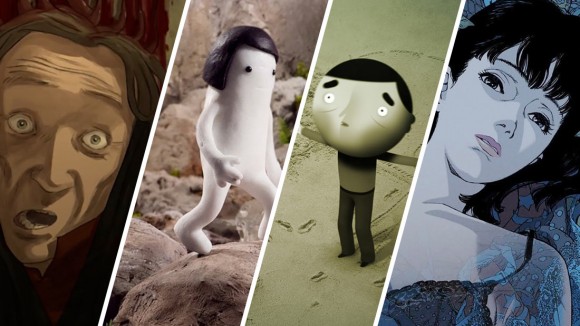

Interview: GLAS Animation Festival Director Jeanette Bonds
Starting this Thursday, members of the independent animation community in the United States, not to mention major industry figures like Henry Selick and Phil Tippett, and a bunch of international guests, will converge in Berkeley, California for the inaugural GLAS Animation Festival.

The four-day festival is the brainchild of filmmaker and CalArts experimental animation MFA grad Jeanette Bonds, who started the GLAS organization to address the lack of institutional support for indie, non-corporate animation in the United States. Bonds envisions the festival as the centerpiece of the non-profit organization, which she intends to expand to include a grant program and a physical space for artist residencies.
Cartoon Brew spoke to Bonds via email to find out all about GLAS, including why she decided to hold it in Berkeley and what visitors can expect from this first edition. For information on tickets and screening schedules, visit the GLAS website.
Cartoon Brew: The first, and probably most obvious, question is why did you start GLAS?
Jeanette Bonds: After graduating CalArts in the Experimental Animation program I began searching for independent filmmaking grants in the US and discovered my options were rather limited. The vast majority of filmmaking grants that are focused specifically on animation exist internationally. This led me to think, ‘Why doesn’t the US have organizations such as this?’ Although the US has a strong animation industry, there isn’t a supportive structure for independent animated filmmaking in place. I wanted to create an organization that functions as a resource for independent animators that would cultivate and promote independent animation in the US; and a large part of this included establishing an animation festival emphasizing independent animation.
The last major international animation festival that took place in the U.S., to my recollection, is Platform in 2007. From your perspective, why are these kind of festivals so difficult to launch in the States whereas dozens of them take place every year throughout Europe, Latin America, and Asia?
Jeanette Bonds: Trying to do a festival at this scale requires financial support, which is more difficult to get in the United States. The international festivals such as Annecy, Hiroshima, Zagreb, etc., have long track records, government support, and have demonstrated their cultural value and staying power but also importantly, there is more of a mainstream appreciation for independent or serious animation in places like Europe or Japan. Along with the burgeoning independent scene in the US, there is demand for this culture to be fully represented at a festival within the US where filmmakers can gather together to showcase their work, see new films, meet one another, and meet international filmmakers. GLAS can facilitate this by supporting independent animators and building a strong movement of independent animation filmmaking in the US.
Why did you choose Berkeley for the site of the first GLAS, as opposed to Los Angeles, where there’s more animation artists?
Jeanette Bonds: Berkeley is a city with a progressive past, and as such it’s a good location for a progressive festival. It has a thriving arts culture, several schools, and is close to studios and tech companies. It also hit all the practical logistical requirements we had in mind when looking for a city: multiple theaters, galleries, several hotels, and restaurants are all within walking distance which is ideal for guests traveling internationally; by its very nature the city is structured to allow the festival to expand into something larger in the years to come. We also wanted a city that animators from Los Angeles could escape to, so guests visit the city for the festival experience as opposed to trying to avoid traffic while returning back to their apartments.
Talk about the biggest stresses of launching a major festival like GLAS?
Jeanette Bonds: The biggest stress has been securing the financial support to make this festival as big as I envisioned. I’ve learned much this year about how competitive grants are for non-profits, particularly non-profits in their first years. But we managed to gather the support of some incredible companies, organizations, and individuals who are excited to collaborate and support us to make GLAS possible and elevate GLAS to a higher level for our inaugural year.
Talk a little bit about how you put together this year’s program, and how you selected the guests/talks.
Jeanette Bonds: Themes developed and evolved naturally throughout the curating process. Our programming philosophy is to emphasize contemporary filmmaking, independent visions, and emerging talent, and as such we wanted our guests to represent this. We also want to trace a history of influence, paying tribute to artists who have inspired independent filmmakers, and more specifically artists and curators who have a strong independent vision.
We looked for a good balance of filmmakers and curators who have helped to expand the scope of animation both nationally and internationally. Jeremy Clapin, Sara Gunnarsdottir, Kirsten Lepore, and Hisko Hulsing have signature visual and filmmaking styles; Nobuaki Doi and Gerben Schermer represent different parts of the world with recognizable curatorial methodologies; Henry Selick and Phil Tippett have permanently impacted independent and commercial filmmaking; Peter Millard and Caleb Wood represent a new wave of experimental animators; and festival honoree Paul Vester embodies a lifetime of dedication to an independent vision we value at GLAS.
For competition selections I watched each submission and reduced the number to about 20%, which were then sent to our selection committees consisting of Einar Baldvin, Sean Buckelew, Pia Borg, Christine Panushka, Jisoo Kim, Rob Munday, and myself. For the final arrangement, much like Ottawa, we show all competition categories together which places both professional films and student films in the same context.
What do you want attendees — both filmmakers and filmgoers — to get out of GLAS?
Jeanette Bonds: Our primary goal is to broaden and redefine the perception of animation in the US, moving it away from its current association as a commercial genre to being considered as a serious art form with no boundaries, and worthy of serious attention. We want to bring this wide breadth of talent and have people in the States able to see it all in a cinematic context. We believe in the power of a festival as a great context to view films and an instigator for building communities and relationships. Even if you’re a seasoned festival attendee, you’ll find something new to discover at GLAS, and if you’re completely new to the world of independent animation, this first year would be a great primer on the exciting things are happening.

